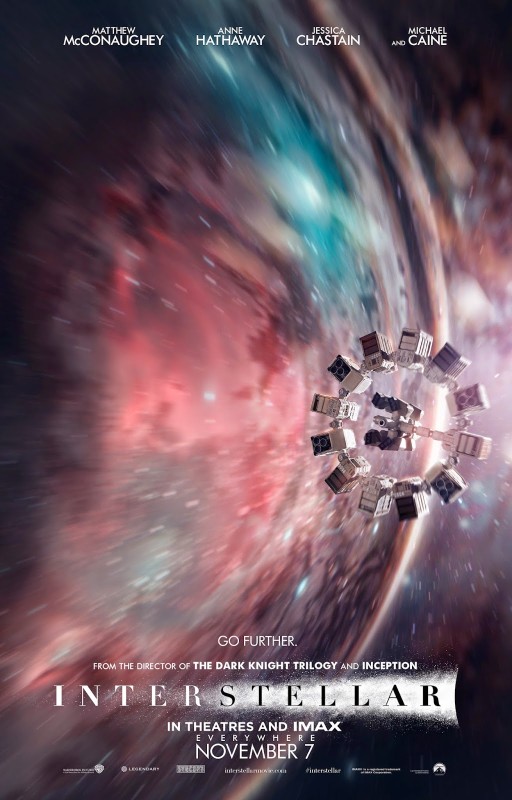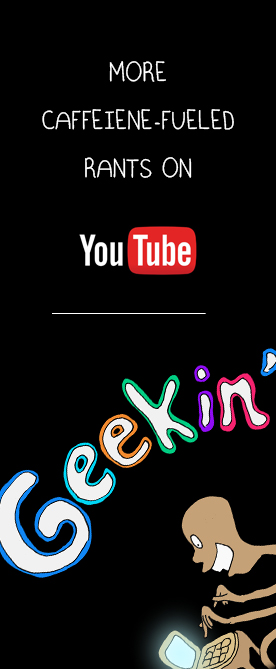By James Hancock November 7th, 2014
Technically I’ve already reviewed “Interstellar” with my co-hosts on our podcast Wrong Reel, but when I looked atrottentomatoes.com today and saw that “Interstellar” was getting ravaged by a variety of critics I felt I needed to chime in and add my unsolicited opinions to the conversation. I saw the movie at midnight on Tuesday in 70mm IMAX and I was completely stunned and had to walk a few blocks just to process the experience. A lot of people have complained about the change in aspect ratios throughout the film, but for me the IMAX sequences, seen on what I think is the largest screen in New York, absolutely fried my eyeballs with the kind of visual ecstasy that most cinephiles are always hoping to find. I’ve read a variety of reviews over the last few days and without naming names I’ve been a little confused by some of the negative reactions. It seems to me that too many have decided to review the film they thought they would see rather than judging this film for what it is, a film that in my opinion is the most ambitious, thought-provoking work of Christopher Nolan’s very solid career. Almost never do we have a colossal production made for mainstream audiences that so fearlessly tackles big ideas. Is the film 100% successful at everything it attempts to do? Certainly not, but I’d argue that no film in history has been 100% successful and this is a pointless way to judge a film which by its very nature is a subjective experience for the viewer. Perhaps some people thought they were going to get a great looking thrill ride and nothing more but I’d argue that this film provides all the spectacle and escapism one could hope for in addition to having the courage to explore some of the biggest boldest concepts in the history of the science fiction genre.
For me the best science fiction holds up a mirror to our society and has something to say about who we are and where we are heading as a species. I absolutely love some good old-fashioned cosmic space opera like James Gunn’s “Guardians of the Galaxy” but very rarely do we get something like “Metropolis” (1927), “2001: A Space Odyssey” (1968), or “Blade Runner” (1982) where the film offers more depth than a simple adventure. “Interstellar” takes place in the not-so-distant future in the aftermath of global food shortages. All technology and human resources have been redirected into farming, but in the panic to look after the basic necessities of survival, mankind has seemingly forgotten how to innovate and look to the future. Matthew McConaughey plays Cooper, a former pilot for NASA, who finds himself living in a world of knuckle-draggers, many of whom doubt that space travel was ever possible. To make matters ever more dire, a blight is spreading across the planet gradually causing crops to fail in addition to slowly depriving our atmosphere of oxygen. In short, the Earth is capable of sustaining life for only one more generation where the last people to starve will be the first people to suffocate. When Cooper’s brilliant young daughter Murph (played by Mackenzie Foy, Jessica Chastain and Ellen Burstyn at different points in the character’s life) intercepts a message from what might be alien intelligence, Cooper finds himself recruited by the remains of NASA to seek out a new planet that can sustain human life. Fifty years prior to the start of the movie a wormhole mysteriously appeared near Saturn allowing travel to another galaxy and several astronauts have already gone through on a suicide mission to try and lay the groundwork for a possible human colony on another world. Given the nature of time dilation near black holes and travel at the speed of light, Cooper decides to risk never seeing his family again in order to have a chance at finding a way to save them and the rest of the human race from certain death. What follows is epic science fiction and even when the story proves to be too melodramatic, characters feel unnecessary (sorry Topher Grace), or when I second guessed some story decisions, the overall result of the film is an awe-inspiring mind expanding adventure that challenges the intellect as often as it stimulates the senses.
I don’t want to get into too many spoilers, especially since these spoilers are what will likely divide audiences seeing the movie. The one spoiler I’ll offer is that seeing the movie in 70mm IMAX felt like a religious experience. The visuals are completely overwhelming particularly when accompanied by Hans Zimmer’s score. Watching the way light bends around a black hole named Gargantua before vanishing beyond its event horizon is worth the price of admission alone. My favorite scenes feature Cooper and his team deep in space debating which of the three potentially habitable planets to explore first. Visiting each planet involves trade-offs on fuel, resources, but more importantly time. Traveling near the orbit of Gargantua distorts time to such an extent that one hour of exploration equates to seven years back on Earth, years that bring the human race that much closer to its inevitable extinction. While the screenplay has been justifiably criticized by most critics, where the script really shines for me is in those scenes where the characters discuss gravitational time dilation and general theories of relativity in a way that is not only comprehensible to morons like myself but also in a way that gives the scenes incredible dramatic tension.The rigors and realities of Interstellar travel are fascinating to think about and Michael Caine has one terrific scene where he describes how interstellar travel requires mankind to think as a species instead of in terms of personal relationships. Even without the unbelievable effects of a black hole like Gargantua, some of the explorers often go into suspended animation for years at a time traveling planet to planet or while waiting for reinforcements to arrive on a new world. This is the first movie in many years that has genuinely fired up my excitement and curiosity about mankind’s place in the stars. As much as I enjoyed the movie, however, I will concede that I still have mixed feelings about the finale of the film. Nolan and his team don’t completely stick the landing and I think that after a nearly 3-hour story, this dissatisfaction is what has led to so many writers sharpening their knives when discussing the film. All that aside, I find it thrilling watching the evolution of Christopher Nolan’s career. As much as I miss his presence in the world of comic book heroes, as a filmmaker he clearly feels compelled to tackle more challenging subject matter. Personally I’d love to see Nolan explore something like the Napoleonic Wars or perhaps the excesses of the Roman Empire. No matter what he tries next, I’ll be first in line. Nolan is one of the only filmmakers in the world working on films of this size who has the track record to take huge risks and it is my sincere hope that when it comes to his filmography the best is yet to come.
I am one of the Co-Hosts of Wrong Reel and you can find our content here:






